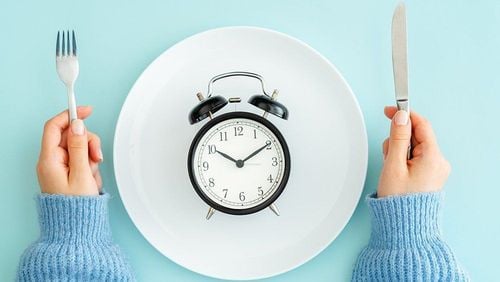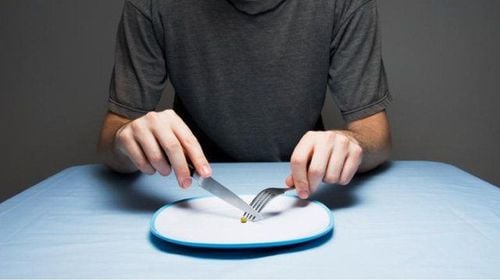This is an automatically translated article.
If you find yourself stuck in a "yo-yo diet" cycle for weight loss that doesn't work, intermittent fasting can help. Intermittent or intermittent fasting is not a typical diet, but weight loss and intermittent fasting often go hand in hand. Intermittent fasting is a lifestyle change, so what you eat and how you eat can help you lose weight. In this article, we'll dive into the average weight loss process with intermittent fasting.1. What is intermittent fasting for weight loss?
Surely you will be confused because there are many weight loss strategies and diet plans. This includes intermittent fasting or intermittent fasting. Intermittent fasting is a diet that alternates between short periods of fasting, no eating or significant calorie reduction, and periods of unrestricted eating. This diet is recommended to alter the composition of food consumed through a reduction in fat mass and improvement of disease-related health markers such as hypertension and blood cholesterol levels.The origins of intermittent fasting are rooted in traditional fasting, a popular ritual used for mental health or benefit as described in the early texts of Socrates, Plato and groups religion. Fasting usually requires regular fasting from food and drink, from 12 hours to a month. It may require complete abstinence or allow a reduction in food and drink intake.
Prolonged very low calorie diets can cause physiological changes that cause the body to adapt to calorie restriction and thus prevent further weight loss. Intermittent fasting tries to solve this problem by exercising in the midst of low calories for a short time, then eating normally. However, studies have inconsistently shown that intermittent fasting is better than intermittent low-calorie diets in terms of weight loss effects.
The most common methods are fasting on alternate days, all day at a specific frequency each week or within a set time frame.
Intermittent fasting throughout the day, alternating between days of no food restriction with days of only one meal providing about 25% of daily calorie needs. For example, Monday-Wednesday-Friday includes fasting, while alternate days have no food restrictions. Full-day fasting: 1-2 days per week fasting completely or up to 25% of daily calorie needs, with no food restrictions on other days. For example, the 5:2 Diet Approach advocates no food restriction on five days of the week, cyclically with a 400-500 calorie diet on the other two days of the week. Time-limited fasting: Follow a meal plan each day with a designated time frame for fasting. Example: Meals are taken from 8 a.m. to 3 p.m. and fasted for the rest of the day.
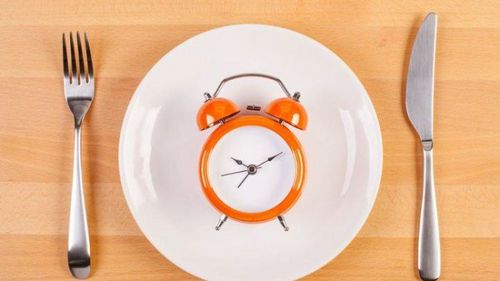
Các phương pháp phổ biến nhất là nhịn ăn vào các ngày xen kẽ, cả ngày với tần suất cụ thể mỗi tuần hoặc trong một khung thời gian đã định
Diabetes Eating disorders associated with loss of appetite or nausea Use of growth phase disease medications, such as in adolescents Pregnant women, lactating women
2. How does intermittent fasting help you lose weight?
2.1. Some Intermittent Fasting Methods Affect Weight Loss There are a number of different methods of intermittent fasting including:16:8 Method 5:2 Diet Warrior Diet Eat Stop Fasting alternate day (ADF) All methods can work, but figuring out which works best depends on the individual. To help you choose the right method for your lifestyle, here's a breakdown of the pros and cons of each.
16/8 Method The 16/8 intermittent fasting plan is one of the most popular types of fasting during weight loss. The plan restricts the consumption of calorie-containing foods and beverages to a set period of 8 hours each day. It requires fasting for the remaining 16 hours of the day.
While other diets may set strict rules and regulations, the 16/8 method is based on a time-restricted feeding (TRF) pattern and is more flexible. You can choose any 8-hour time frame to consume calories.
Some people choose to skip breakfast and fast from noon to 8pm, while others avoid eating late and stick to 9am to 5pm. Limiting the number of times you eat during the day can help you lose weight and lower your blood pressure.
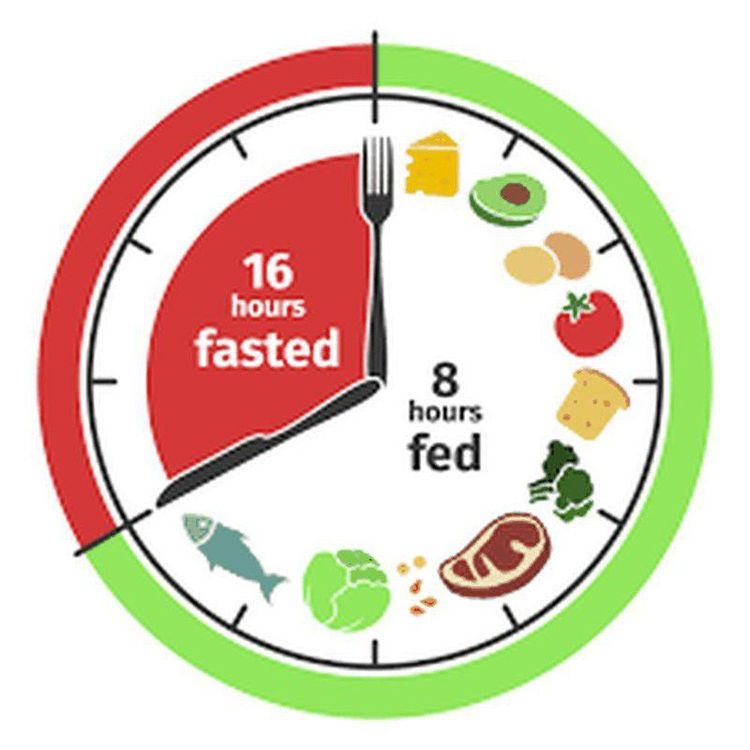
Kế hoạch nhịn ăn gián đoạn 16/8 là một trong những kiểu nhịn ăn phổ biến nhất trong quá trình giảm cân
While the 16/8 method can easily fit into any lifestyle, some people may find it difficult to avoid eating for 16 hours straight. Additionally, eating too many snacks or treats during your 8-hour period may negate the positive effects associated with 16/8 intermittent fasting. Make sure to eat a balanced diet that includes fruits, vegetables, whole grains, healthy fats, and protein to maximize the potential health benefits of this diet.
5:2 Method The 5:2 diet is a simple intermittent fasting plan. Five days a week, you can eat normally and have no calorie restriction. Then, for the remaining two days of the week, you must reduce your calorie intake to one-quarter of your daily requirement. For someone who regularly consumes 2,000 calories per day, this means reducing their calorie intake to just 500 calories per day, two days per week.
According to a 2018 studyTrusted Source , the 5:2 diet is just as effective as daily calorie restriction for weight loss and blood sugar control in people with type 2 diabetes.
The 5:2 diet offers flexibility, as you can choose the days you fast, and there are no rules about what or when to eat on full-calorie days. That said, it's worth mentioning that eating "normally" on full-calorie days doesn't give you any chance of eating whatever you want.
Limiting yourself to just 500 calories a day is not easy, even if it's only for two days a week. Plus, consuming too few calories can make you sick or faint. The 5:2 diet can work, but it's not for everyone.
Eat Stop Eating Eat Stop Eating is a unique approach to intermittent fasting popularized by Brad Pilon, author of the book “Eat Stopping.” This intermittent fasting plan involves identifying one or two intermittent days per week that you must fast or fast in a 24-hour period. During the rest of the week, you can eat as much as you want, but you should eat well and avoid overconsumption.
The rationale behind the weekly 24-hour fast is that consuming fewer calories will lead to weight loss. Fasting for up to 24 hours can lead to metabolic changes that cause your body to use fat as an energy source instead of glucose. But avoiding food for 24 hours at a time requires a lot of willpower and can lead to binge drinking and overconsumption later on. It can also lead to eating disorders.
Alternate fasting during the day

Nhịn ăn xen kẽ ngày là một kế hoạch nhịn ăn không liên tục với cấu trúc dễ nhớ
Alternating day fasting has proven weight loss benefits. A randomized pilot study comparing alternate day fasting with daily calorie restriction in obese adults found that both methods were equally effective for weight loss.
Fasting every other day can be excruciating, especially if you're new to fasting. Overeating on non-fasting days can also be appealing. If you're new to intermittent fasting, it's easy to switch to alternate-day fasting with a modified fasting plan.
Warrior Diet The Warrior Diet is an intermittent fasting plan based on the eating patterns of ancient warriors. Created in 2001 by Ori Hofmekler, the Warrior Diet is a bit more rigorous than the 16:8 method but less restrictive than the Eat Fast Eat method. This diet consists of eating very little for 20 hours during the day, and then eating as much food as desired over the course of 4 hours at night.
The Warrior Diet encourages dieters to consume small amounts of dairy products, hard-boiled eggs, raw fruits and vegetables, as well as zero-calorie liquids during a 20-day fasting period. hour.
After this 20 hour fast, people can basically eat whatever they want for a period of 4 hours, but organic, healthy and unprocessed foods are encouraged. Although there are no specific studies on the Warrior Diet, human studies indicate that time-restricted feeding cycles can lead to weight loss.
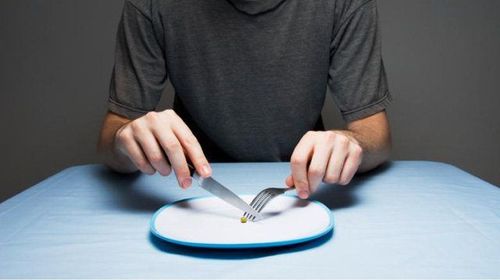
Chế độ ăn này bao gồm ăn rất ít trong 20 giờ vào ban ngày, và sau đó ăn nhiều thức ăn như mong muốn trong suốt 4 giờ vào ban đêm
2.2. Weight loss effects of intermittent fasting Here are two metabolic changes that occur when you intermittent fast :
Insulin . Insulin levels rise when you eat, and when you fast, insulin drops dramatically. Lower insulin levels facilitate fat burning. Norepinephrine (noradrenaline). Your nervous system sends norepinephrine to fat cells, causing them to break down body fat into free fatty acids that can be burned for energy. Interestingly, despite what some advocates of consuming five to six meals a day claim, short-term fasting can help increase fat burning in the body. Research has shown that alternate fasting trials lasting 3-12 weeks, as well as full-day fasting trials lasting 12-24 weeks, results in reduced body weight and body fat. Another hormone that undergoes rapid changes is human growth hormone (HGH), whose levels can increase up to 5 times.
Previously, human growth hormone was thought to help burn fat faster, but new research suggests it may signal the brain to conserve energy, potentially making it harder for you to lose weight . By activating a small number of protein-related neurons (AgRP), human growth hormone can indirectly increase appetite and decrease energy metabolism.
The main reason intermittent fasting works for weight loss is that it helps you eat fewer calories. All these different processes involve skipping meals during fasting. Unless you compensate by eating more during the mealtime, you will consume fewer calories.

Lý do chính mà nhịn ăn gián đoạn có tác dụng giảm cân là nó giúp bạn ăn ít calo hơn
That said, the benefits of intermittent fasting go far beyond weight loss. It also has many benefits for metabolic health and may even help reduce the risk of metabolic cardiovascular disease. While calorie counting is not usually required during intermittent fasting, weight loss is primarily accomplished through a reduction in overall calorie intake.
In short, intermittent fasting is a convenient way to lose weight without counting calories. Many studies show that it can help you lose weight and belly fat. Interestingly, several studies have shown that intermittent fasting may be beneficial for maintaining muscle mass while reducing body fat. One scientific review found that intermittent calorie restriction induces similar weight loss as continuous calorie restriction, but with much less muscle loss. Intermittent fasting makes healthy eating simpler for many people, and one of the main benefits of intermittent fasting is its simplicity. Instead of counting calories, most intermittent fasting regimens simply ask you to remember the time. The best diet for you is one that you can stick to in the long run. If intermittent fasting makes it easy to follow a healthy diet, it has clear benefits for long-term health and weight maintenance.
2.3. How to successfully lose weight with intermittent fasting
There are a few things you need to keep in mind if you want to lose weight with intermittent fasting:
Food quality. The food you eat is still important. Try to eat mostly safe and quality foods. Calories. Calories still count. Try to eat normally during the non-fasting period, do not overeat to make up for the calories you missed when fasting. Consistency. Just like any other weight loss method, you need to be persistent for a long time if you want it to be effective. Patient. It may take your body some time to adapt to intermittent fasting. Try to be consistent with your meal schedule and things will get easier.

Cố gắng ăn hầu hết các loại thực phẩm đảm bảo chất lượng và an toàn
Please dial HOTLINE for more information or register for an appointment HERE. Download MyVinmec app to make appointments faster and to manage your bookings easily.
Reference source: hsph.harvard.edu; healthline.com




